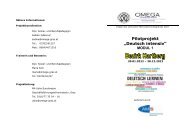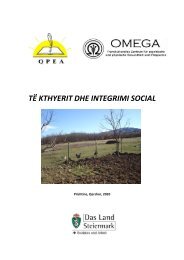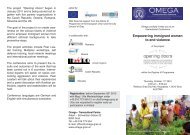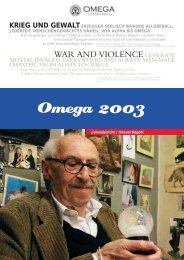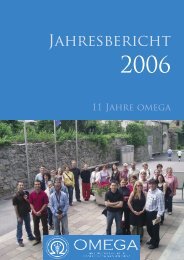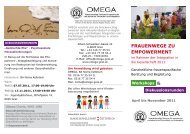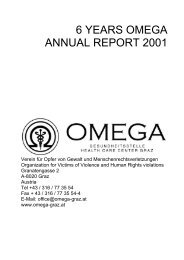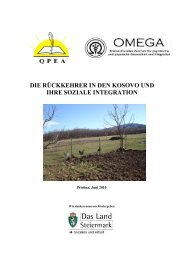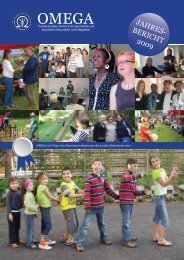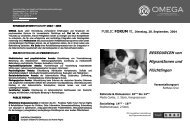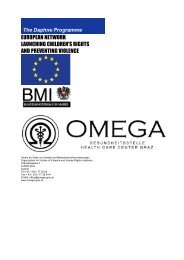Meine Träume? Ich möchte viel mehr Deutsch lernen, viele ... - Omega
Meine Träume? Ich möchte viel mehr Deutsch lernen, viele ... - Omega
Meine Träume? Ich möchte viel mehr Deutsch lernen, viele ... - Omega
Erfolgreiche ePaper selbst erstellen
Machen Sie aus Ihren PDF Publikationen ein blätterbares Flipbook mit unserer einzigartigen Google optimierten e-Paper Software.
OMEGA-Fortbildungsveranstaltungen, Seminare, Konferenzen und Kongresse<br />
OMEGA Annual Report 02<br />
22<br />
Weiterbildung im Rahmen des Projekts:<br />
ÖFFENTLICHES FORUM MENSCHENRECHTE - KINDERRECHTE & REHABILITATIONSPROGRAMM FÜR KINDER<br />
1. Die OMEGA-Gesundheitsstelle organisierte 2002 ein internes Weiterbildungscurriculum, das<br />
auch FlüchtlingsbetreuerInnen und MitarbeiterInnen anderer lokaler NGOs offen stand. In 4<br />
Modulen [Tagesseminaren] zwischen April und November wurde über folgende Themen<br />
referiert und diskutiert: Anamnesearten, Anamneseerhebung, psychiatrische Grundbegriffe,<br />
„psychopathologischer“ Status, Grundlagen der Kommunikation, Stress, Trauma,<br />
Flüchtlingskrise, rechtliche Grundlagen im Flüchtlingsbereich, Gesprächsführung in<br />
Krisensituationen, Coping-Strategien, Adaption, Risiko- und Schutzfaktoren.<br />
2. Eine Fallsupervision und Fortbildung für OMEGA-Flüchtlingsbetreuerinnen und –betreuer<br />
wurde angeboten. Salah Ahmed vom Berliner Zentrum für Folteropfer und Anne Bovbjerg vom<br />
Roten Kreuz-Asylabteilung Kopenhagen standen den OMEGA-MitarbeiterInnen am 11./12.<br />
Dezember 2002 für Fallbesprechungen zur Verfügung. Das gesamte Projekt [Forschung und<br />
Supervision] wurde von Tammy Bean [Niederlande] und Nancy Cohn begleitet.<br />
3. 29.11.2002 – 30.11.2002: Seminar: Trauma-Transmission - Brennpunkt: Kriegstraumata<br />
Das ungesehene Leid der psychischen Langzeitfolgen für die 1. und 2. Generation.<br />
Seminarleitung: Dr. med. Peter Heinl, MRCPsych. Diese Fortbildungsveranstaltung, an der 12<br />
Personen teilnahmen, stand auch Ärzten, Psychiatern, Psychotherapeuten, Psychologen und<br />
Sozialarbeitern anderer lokaler Vereine und Institutionen offen.<br />
Aus dem Ausschreibungstext des Seminars:<br />
„Die in jüngerer Zeit zunehmende Beschäftigung der Medien mit dem 2. Weltkrieg ist ein Anzeichen<br />
dafür, dass die psychologische Bewältigung des 2. Weltkrieges noch lange nicht abgeschlossen ist,<br />
ja <strong>viel</strong>leicht überhaupt erst beginnt. Dieser Prozess der Auseinandersetzung rückt auch einen in<br />
seiner Größenordnung wie Komplexität ebenso gravierenden wie bislang extrem vernachlässigten<br />
Bereich der Psychotraumatologie langsam in das Blickfeld, nämlich die psychologischen<br />
Langzeitfolgen von Kriegskindheitstraumatisierungen für die 1. und 2. sowie auch weitere<br />
Generationen. Ziel dieses Seminars ist es, das Bewusstsein, die Wachsamkeit und die klinische<br />
Kompetenz für dieses, auch aus heutiger Sicht wichtige, facettenreiche und komplexe Gebiet der<br />
Psychotraumatologie zu fördern, dessen brennende Aktualität auch aus der Sicht neu<br />
aufflammender Kriegsbedrohungen offensichtlich ist.“<br />
OMEGA Annual Report 02<br />
07<br />
Public Health and the work of OMEGA<br />
Public Health has been defined as, „The science and art of preventing disease, prolonging life, and promoting health through the<br />
organised efforts of society“ 1 . It has also been described as an art, a science, a practice, a social institution and an academic discipline.<br />
As a discipline, at best it is not more nor less than a common forum within which the many different players [health professionals<br />
of all kinds, individuals, community representatives, politicians] can discuss how best to build healthy societies. In this<br />
regard, Public Health is a dynamic and changing endeavour as, collectively, societies strive towards the goal of health as „a state of<br />
complete physical, mental and social well-being and not merely the absence of disease infirmity“ 2 . To achieve this ideal, the content<br />
of Public Health has shifted from a focus on health protection and prevention of disease and injury to the promotion of health<br />
at all levels of society. The move towards a health promotion perspective broadened the boundaries of Public Health, with the<br />
growing awareness that health for all could only be attained through, „national political will, commitment and coordinated efforts<br />
of all sectors of society“.<br />
Perhaps it is important here to identify some key principles that underpin Public Health, as defined in several [relatively] consensus<br />
documents concerning health of whole populations. Firstly, health at the level of whole communities is essentially a call<br />
for social justice and equity 4 . In particular equity considers the level of need in the targeting of resources to those sections of a<br />
community most in need, not just equal provision of resources. This is reflected in numerous EU documents seeking to address<br />
the issue of social exclusion. It is also reflected in the recognition within Public Health practice that the most significant determinants<br />
of health are socio-economic determinants 5 .<br />
Secondly, Public Health is the business of individuals, families, communities and social institutions such as Governments, and that<br />
coordinated and intersectoral activity between all these is essential 4, 6 .<br />
Third, primary health care - the comprehensive, accessible provision of health care, health education, and advocacy for health<br />
across all sectors of society and Government, is a key to achieving the health of whole populations 2 .<br />
On the basis of these principles, non-Government Organisations are key players in addressing<br />
health inequalities and achieving health for all. Such organisations provide health and social services<br />
in the context of people’s daily lives, and at best provide a gateway to further services, for<br />
those with special needs or excluded from mainstream services. They also advocate at a policy<br />
level across all sectors of Government or society where barriers to the health and well-being<br />
of their communities persist.<br />
Civil and international conflict remains a significant barrier to the achievement of health for all. This is not only for the obvious<br />
reasons of the breakdown of social and health infrastructure that accompanies civil strife, or the physical and psychological consequences<br />
for individuals. There is also the dislocation of large numbers of people who seek safe asylum elsewhere and bear the<br />
burden of loss, including the loss of personal autonomy, an important resource for the health of any individual 5 . Verein OMEGA,<br />
together with many other NGOs supporting the needs of migrant, refugee and asylum seekers who find themselves in Graz, are<br />
Public Health in practice. As well as primary medical care for physical and psychological well-being [in partnership with<br />
Marienambulanz], OMEGA provides outreach and preventive services, promotes well-being through psychosocial learning programs,<br />
and is an active advocate on behalf of those it serves.<br />
If you are still unsure just what Public Health is, and how you can add your voice to that forum, the documents below may [or<br />
may not] help to clarify this for you, or alternatively, please spend some time visiting OMEGA, ISOP, Zebra or one of the many<br />
other NGOs active in your community.<br />
1. Acheson, D [Chairperson]. Public Health in England: The Report of the Committee of Inquiry into the Future<br />
Development of the Public Health Function, Cm 289, 1988.<br />
2. Declaration of Alma-Ata: International Conference on Primary Health Care, Alma-Ata, USSR, September 1978.<br />
3. Ottawa Charter for Health Promotion: First International Conference on Health Promotion, Ottawa, November 1986<br />
4. Health-for-all policy for the twenty-first century. Resolution of the Fifty-first World Health Assembly [Resolution<br />
WHA51.7], 1998.<br />
5. Independent Inquiry into Inequalities in Health: Report of the Committee chaired by Sir Donald Acheson, London<br />
TSO 1998.<br />
6. Communication on the development of public health policy in the European Community. Commission of the<br />
European Communities, 1998<br />
7. The United Kingdom Parlament. House of Commons Select Committee on Health: Second Report on Public Health,<br />
2002.




